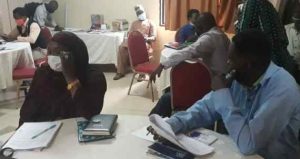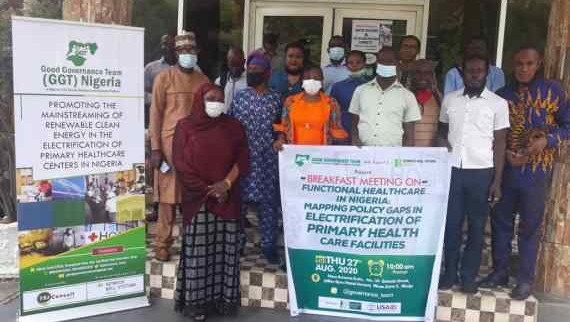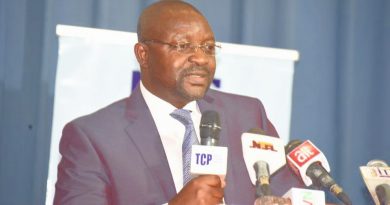PRIMARY HEALTH CARE: GGT Holds Meeting on Renewable Energy
Oru Leonard
Good Governance Team (GGT), Nigeria in partnership with HEINRICH Boll Stiftung Foundation has called on stakeholders and the media to create awareness and advocate to drive the needed policy and Legislative change for the mainstreaming of renewable energy solutions in the electrification of Primary Healthcare Centres (PHCs), in Nigeria.
This was stated in a breakfast meeting which held at Abuja on Thursday, August 27, 2020. convened by the Good Governance Team led by Mallam Tunde Salman, was themed “Mapping Policy Gaps in Electrification of Primary Health Facilities for Functional Healthcare in Nigeria”,
 Cross Section of participants
Cross Section of participants
GTT and other stakeholders in the health sector belief that there is need to put in place laws, policies, provisions and checks to ensure that PHCs across the country can function optimally.
GGT fact sheet states that solar is a better option for a functional PHCs not fossil generator or an unrelible grid it also added that with the sum of N2.5million – N4million PHCs can have round the clock cleaners,cheaper, reliable, noiseless energy with solar energy with a 7 years working guaranty.
The team are advocating for a policy review in health sectors in order to identify the gaps in the provision of health infrastructure functionality especially as it relate to power supply, also build a case for the mainstreaming of renewable electricity for the PHCs for consideration and implementation by relevant actors and decision makers finally use the policy position paper to engage the relevant stakeholders and actors in the executive, Legislative chambers, the civil society, media and general public to ensure that the issue of electrifying the health sector is given priority even in the the country were electricity deficit has become an established reality.
It should be noted that these policies shows the intention of Nigeria to achieve an electricity vision of attaining 30,000MW of power by the year 2030 with at least 30% renewable energy in the electricity mix (Electricity Vision 30:30:30).
All communities members were PHCs are located and their local governments should review FGN budgets to determine which projects have been allocated to their communities and as such, follow up, monitor and ensure that the responsible parties implement the projects according to specifications.
According to (W.H.O), the standard operating procedures for most hospitals require energy use for water supply, temperature control, lightning, ventilation and clinical processes. Whilst the connection between energy and health is so strong and critical for the effective delivery of quality healthcare services.
Presently, Nigeria has over 30,000 primary health care centres (PHCs) across the 36 states and federal capital territory (FCT) Abuja with less than 6,000 of them working effectively which is less than 20% of the entire PHCs in the country,the over 80% of these poorly functional PHCs are located n populated poor communities in the urban and far remote villages, which are far away from the daily eyes of our elected leaders, hence the ability of these healthcare facilities to provide certain services to meet the health needs of the people is undermined by the unavailability of energy supply, consequently we record daily deaths of our beloved mothers and children because they are vulnerable and are frequently seen patronizing the PHCs.
Most of these deaths are highly preventable if effective (functional) primary health care services are in place.
More often, drugs and vaccines cannot be stored in most PHCs due to poor or no grid-electricity supply, which also affect immunization coverage and may compromise the quality of administered vaccines. Needless to state that most PHCs lack access to reliable electricity and innaccessible clean safe water thereby forcing most (PHCs) to obtain or buy water from unreliable and unhygienic sources (mairuwa) for treatment of patients in there wards. (Near death sentence).
PHCs that are supposed to provide clean, healthy and conducive environment are exposed to acute respiratory illnesses that come from air pollutions given the frequent use of fossil generator sets and kerosene lamps.
Primary health care centres, boreholes, Grid or renewable electricity are termed constituency projects of Senators and Federal house of representatives members which the rural community members needed to be informed and aware of as their rights and not a privilege from the legislative members.
However, these constituency projects are simply political projects for the legislators to show that they were able to attract federal presence to the communities. Unfortunately, needs assessment or proper evaluation of the contribution of the proposed projects to the host communities are usually not done.
The implication of the political nature of some of the projects is the high level of abandoned, maintenance, financing and uncompleted projects.
A new legislator will not likely request for funds to complete a pending project started by his predecessor. He will rather start new projects from the scratch and abandon the uncompleted one, a sign of lack of structured and continuous government system.




